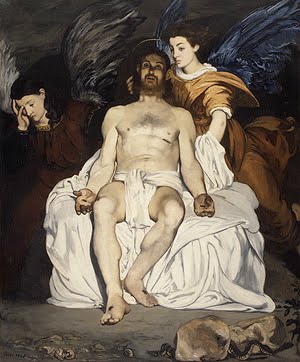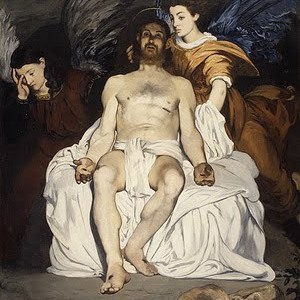I hope everyone’s having a wonderful Christmas, getting plenty of family time in, and all that. If you find yourself on the computer today, I’ve got a few suggestions:
- Pope Benedict’s Christmas Homily
- The first thing we are told about the shepherds is that they were on the watch. They could hear the message precisely because they were awake. We must be awake, so that we can hear the message.
- Let us return to the Christmas Gospel. It tells us that after listening to the Angel’s message, the shepherds said one to another: “‘Let us go over to Bethlehem’ they went at once” (Lk 2:15f.). “They made haste” is literally what the Greek text says. What had been announced to them was so important that they had to go immediately. In fact, what had been said to them was utterly out of the ordinary. It changed the world. The Saviour is born. The long-awaited Son of David has come into the world in his own city. What could be more important?
-
Some commentators point out that the shepherds, the simple souls, were the first to come to Jesus in the manger and to encounter the Redeemer of the world. The wise men from the East, representing those with social standing and fame, arrived much later. The commentators go on to say: this is quite natural. The shepherds lived nearby. They only needed to “come over” (cf. Lk 2:15), as we do when we go to visit our neighbours. The wise men, however, lived far away. They had to undertake a long and arduous journey in order to arrive in Bethlehem. And they needed guidance and direction. Today too there are simple and lowly souls who live very close to the Lord. They are, so to speak, his neighbours and they can easily go to see him. But most of us in the world today live far from Jesus Christ, the incarnate God who came to dwell amongst us. We live our lives by philosophies, amid worldly affairs and occupations that totally absorb us and are a great distance from the manger. In all kinds of ways, God has to prod us and reach out to us again and again, so that we can manage to escape from the muddle of our thoughts and activities and discover the way that leads to him.
-
God has set out towards us. Left to ourselves we could not reach him. The path is too much for our strength. But God has come down. He comes towards us. He has travelled the longer part of the journey. Now he invites us: come and see how much I love you. Come and see that I am here.
-
Let us once again listen directly to the Gospel. The shepherds tell one another the reason why they are setting off: “Let us see this thing that has happened.” Literally the Greek text says: “Let us see this Word that has occurred there.” Yes indeed, such is the radical newness of this night: the Word can be seen. For it has become flesh. The God of whom no image may be made because any image would only diminish, or rather distort him this God has himself become visible in the One who is his true image, as Saint Paul puts it (cf. 2 Cor 4:4; Col 1:15). In the figure of Jesus Christ, in the whole of his life and ministry, in his dying and rising, we can see the Word of God and hence the mystery of the living God himself.
-
This is what God is like. The Angel had said to the shepherds: “This will be a sign for you: you will find a babe wrapped in swaddling clothes and lying in a manger” (Lk 2:12; cf. 2:16). God’s sign, the sign given to the shepherds and to us, is not an astonishing miracle. God’s sign is his humility. God’s sign is that he makes himself small; he becomes a child; he lets us touch him and he asks for our love.
- Athanasius on the Incarnation
- The “Star of Bethlehem” Site.
- Édouard Manet’s The Dead Christ with Angels ( 1864)
These homilies are always good. Here’s the full thing, and here’s a taste:
Honestly, the entire thing is worth quoting. It’s just fantastic. In related news, Benedict was attacked tonight by a crazed woman, but is apparently unhurt, praise God!
I’ve never read it, I’ve heard it was good, and C.S. Lewis wrote the intro for this translation. Plus, it’s available for free, in full. And, oh yeah, it’s on the Incarnation, the reason for the Season, so to speak.
A pretty interesting site exploring the astronomy and history of the birth of Christ, able to pinpoint His death to an exact date, and pointing out some shocking support for the Gospel accounts.
I know, this seems like a weird time to bring up the  death of Christ, but let’s face it: the Magi brought Him myrrh. Jesus Christ was born to die, as morbid as that may sound. And Manet’s Dead Christ with Angels does a better job than virtually anything I know of screaming the truth of the Incarnation at us. Jesus was and is a real Man.
death of Christ, but let’s face it: the Magi brought Him myrrh. Jesus Christ was born to die, as morbid as that may sound. And Manet’s Dead Christ with Angels does a better job than virtually anything I know of screaming the truth of the Incarnation at us. Jesus was and is a real Man.
And that’s something to celebrate.

err — did you mean to point out that the Magi brought myrrh? that’s the one I’ve always heard associated with his death.
But, yes, as the carol goes:
“I wonder as I wander out under the sky.
How Jesus the Saviour did come for to die”
Whoops! Fixed.